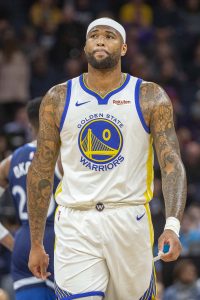Every player who finishes a season as a member of an NBA roster gets some form of Bird rights as a free agent, allowing his team to go over the cap to re-sign him. However, a player who spent just one year with his club typically only has Non-Bird rights, which are the weakest form of Bird rights, as their oxymoronic name suggests.
With the Non-Bird exception, a team can re-sign a player for up to four years and give him a raise, but that raise has to be a modest one. Non-Bird rights allow for a starting salary worth up to 120% of the player’s previous salary. In other words, a Non-Bird free agent who earned $5MM can only get a starting salary worth up to $6MM on his new deal unless his team uses cap room or another exception to bring him back.
This cap restriction will apply specifically to a handful of players around the NBA who appear to be in line for raises this summer. Because these players will be Non-Bird free agents, their teams’ ability to re-sign them will be limited.
Let’s take a closer look at five players who fit this bill for the 2019 offseason:
 DeMarcus Cousins, Warriors (maximum Non-Bird salary: $6,404,400): Cousins’ future has been a popular topic of discussion since the day he signed his one-year contract with the Warriors, since it didn’t appear there was any way for the club to retain him unless he was willing to accept another discount deal. After suffering a torn quad in April, Cousins looked like a possible candidate for another one-year, prove-it contract, but if he continues to shine in the NBA Finals like he did in Game 2, he’ll be able to do better than that on the open market, reducing the likelihood of a return to Golden State.
DeMarcus Cousins, Warriors (maximum Non-Bird salary: $6,404,400): Cousins’ future has been a popular topic of discussion since the day he signed his one-year contract with the Warriors, since it didn’t appear there was any way for the club to retain him unless he was willing to accept another discount deal. After suffering a torn quad in April, Cousins looked like a possible candidate for another one-year, prove-it contract, but if he continues to shine in the NBA Finals like he did in Game 2, he’ll be able to do better than that on the open market, reducing the likelihood of a return to Golden State.- Brook Lopez, Bucks (maximum Non-Bird salary: $4,058,400): As I outlined over the weekend, the Bucks can actually create up to about $10MM in cap room without renouncing free agents Khris Middleton and Malcolm Brogdon or waiving non-guaranteed players like Sterling Brown and Pat Connaughton. If Milwaukee wants to retain Lopez, the team may need to go that route, since he’ll be seeking a much bigger salary than the $3.38MM he earned in 2018/19. Having proven he’s capable of stretching the floor on offense and protecting the rim on defense, he deserves it.
- Austin Rivers, Rockets (maximum Non-Bird salary: 120% of the minimum): After being bought out by Phoenix, Rivers signed with the Rockets for the minimum. Now they won’t be able to offer him more than about $2.77MM without using cap room or the taxpayer mid-level exception. Given how well he played for Houston in the second half, Rivers should do better than that on the open market. Teammate Kenneth Faried may be in a similar boat, having joined the Rockets on a post-buyout minimum-salary deal of his own.
- Seth Curry, Trail Blazers (maximum Non-Bird salary: $3,354,000): The Trail Blazers have three key Non-Bird free agents who will be tough to bring back. Besides Curry, Rodney Hood and Enes Kanter also fall into that group. Portland would probably like to retain all three players, and it’s hard to say which one would be missed most if he signs elsewhere. But my pick is Curry, whose .450 3PT% in the regular season (and .404 playoff 3PT%) was crucial for a team that didn’t have a ton of outside shooting.
- Michael Carter-Williams, Magic (maximum Non-Bird salary: 120% of the minimum): Like Rivers, Carter-Williams was an in-season minimum-salary addition. The former Rookie of the Year rejuvenated his career with the Magic down the stretch, providing some stability behind D.J. Augustin at the point and helping fortify one of the NBA’s best second-half defenses. Carter-Williams won’t get as big a raise as most of the other players on this list, but Orlando will face competition for his services this summer and may lose him.
Photo courtesy of USA Today Sports Images.